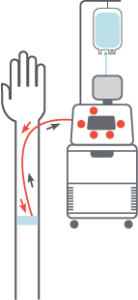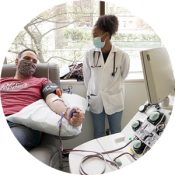Donating Plasma
What is Plasma?
Plasma, the fluid portion of blood — is like a mighty river that transports red blood cells, white cells and platelets through the body to nourish and protect tissues and organs. This pale yellow fluid, which makes up about 55% of our blood’s volume, is also rich in minerals and substances which help control bleeding.
Did you know?
You can safely donate plasma every 28 days, 13 times per year. AB donors can safely give three times the amount of plasma as can be separated from a whole blood donation.
Help out today!
Who needs plasma

Plasma plays an important role when treating patients of trauma, burns, autoimmune diseases, bleeding disorders, organ transplants, and other illnesses and injuries.
The ideal plasma donor

If you have AB+ or AB- blood type, and meet the requirements for donating blood, you probably can give plasma.
A special need for plasma
In addition to being the rarest blood type (only about 3 percent of the population has type AB blood) AB plasma is the universal plasma type. AB plasma can be safely given to patients with any blood type.
The plasma donation process


Through a process called apheresis, blood is drawn from your arm to a sterile, one-use-only kit in an apheresis machine that spins the blood to remove just the plasma, returning the red cells and platelets to your arm. This process takes about seventy minutes to two hours while you read or stream movies. We appreciate your time, and your community appreciates your donation.

Does Bloodworks pay donors for plasma donations?
Bloodworks Northwest is a volunteer donor supported organization and does not pay for blood or plasma donations.
FDA regulations do not permit compensation for blood that is used for transfusion purposes. Studies have shown that volunteer donors provide the safest blood supply for transfusion into patients. Bloodworks is fully committed to remaining a volunteer donor supported organization.
You can advance treatment for life-threatening diseases by donating blood for research. You will be reimbursed for your time and effort for screening and blood donation visits. If you would like to learn more, please contact one of our study coordinators at [email protected] or visit www.bloodworksnw.org/donate/research.
How do I become a plasma donor?
It’s easy. To make your plasma donation appointment, go to bloodworksnw.org/schedule and select Plasmapheresis as your donation type, or call 800-398-7888.
How can I make my donation successful?
- Eat protein-rich, iron-rich meals at least 3 hours before donating, and avoid fatty foods the day of your donation.
- Drink extra fluids and eat a healthy meal before your donation.
- Get a good night’s sleep.
- Wear comfortable clothes, with sleeves that can be pushed up to your shoulder.
- Do not take aspirin or products containing aspirin 48 hours prior to donation.
- Show up a few minutes early.
- Make sure you use the restroom before you donate. Your donation may take up to 2 hours.
- If you need to reschedule, we appreciate 48-72 hours’ notice so we can fill your appointment time with another donor.
What does plasma donation feel like?
Most people say they only feel a slight pinch from the needle at the start of the donation. Because of the apheresis process, your red cells are returned to your body along with an anti-coagulant that may cause some lip tingling, so we offer you Tums since calcium diminishes that effect. That’s also why we encourage donors to eat higher calcium food before donating (like yogurt). And some people say they feel refreshed after donating because of the extra fluid.
How long will my donation take?
Depending on your weight and height, an apheresis donation process will take approximately 70-90 minutes—the perfect amount of time to read, stream a movie, listen to music, have a conversation with the staff, or simply enjoy the quiet.
How long before my body replaces the donated plasma?
Plasma is restored by your body within 24 hours. New, sterile donation equipment (needle, tubing, collection bags) is used for each donor – it is virtually impossible to contract a disease from the process.




